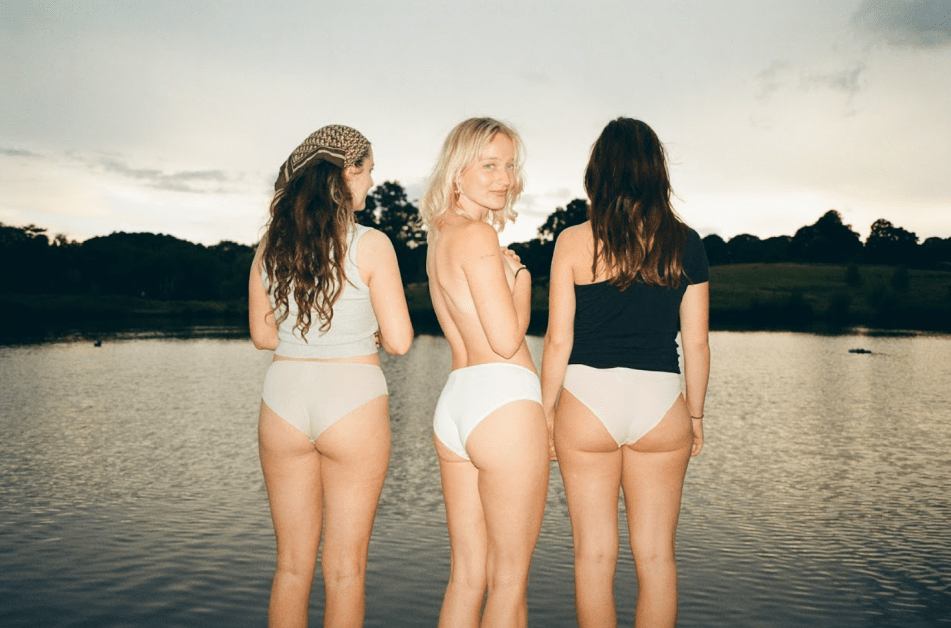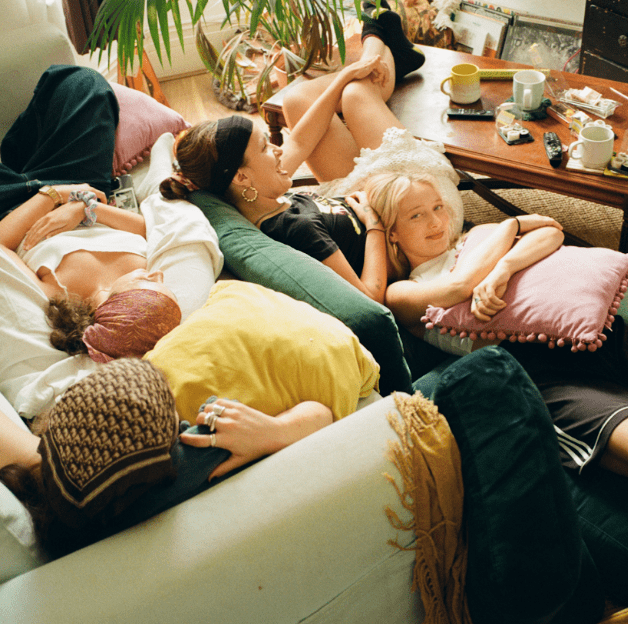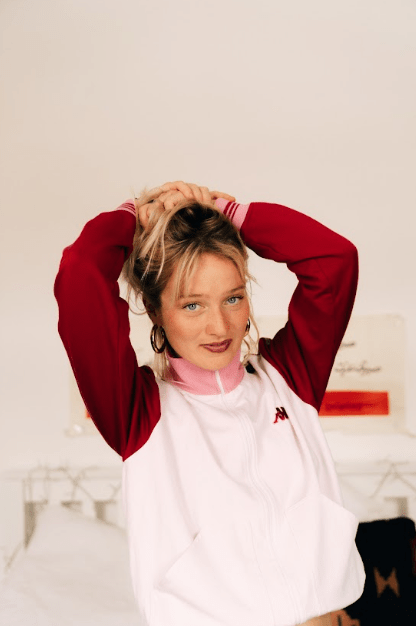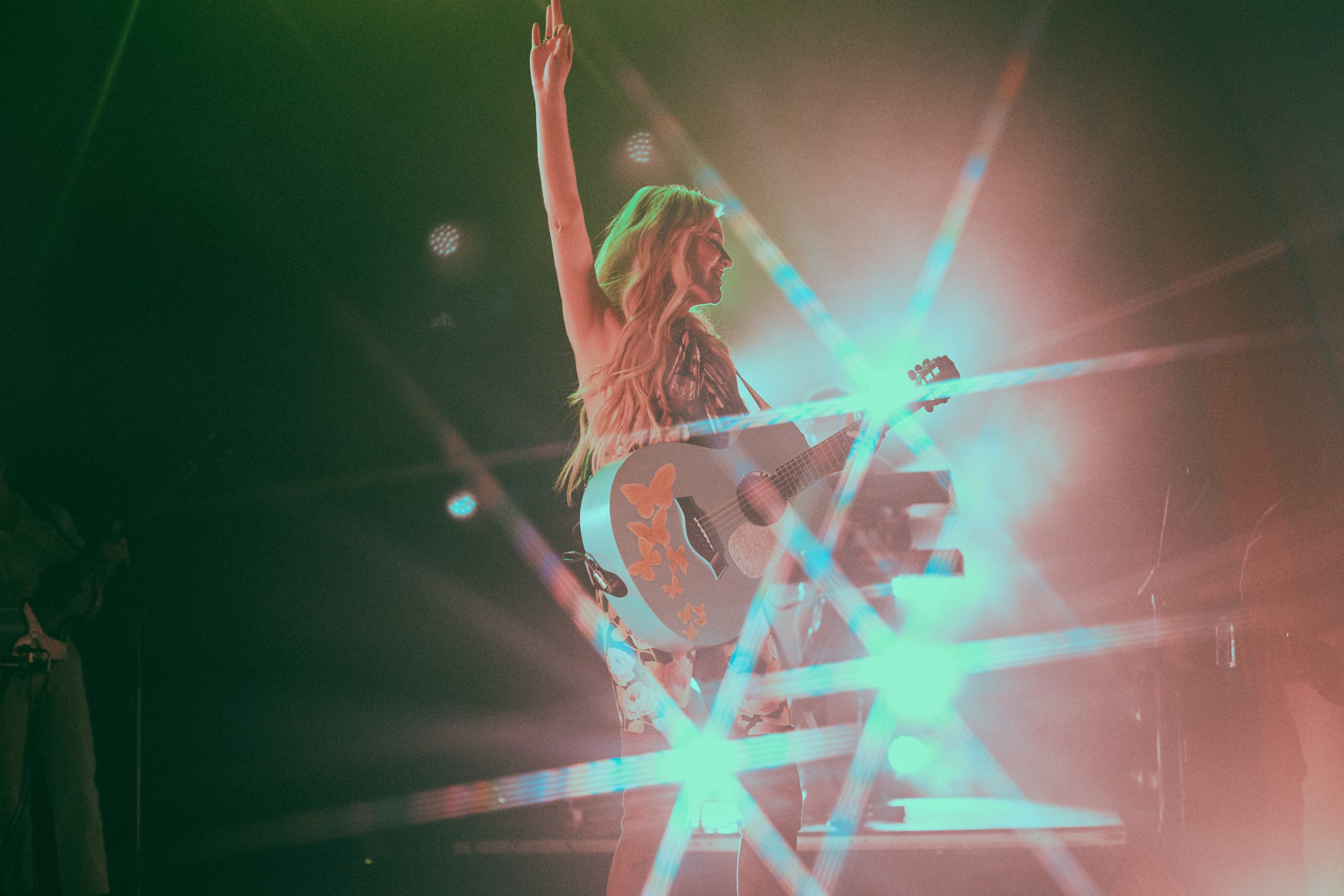British singer-songwriter Jo Hill has officially released her highly anticipated debut album, girlhood., out now via UROK. Featuring standout tracks like ‘SUPERMARKET SUSHI’ and ‘WHERE DID ELLA GO?,’ the album offers a stunning showcase of Jo’s country-pop-inspired sound and her remarkable storytelling ability. From introspective melodies to expansive soundscapes, girlhood. is already being celebrated as one of the most impressive debuts of the year. Jo joins us to talk about the inspirations behind the album, the stories that shaped her music, and what it feels like to finally share girlhood. with the world.

When I meet Jo on Zoom, she admits she’s feeling a bit under the weather. And it’s no wonder, with the busy few weeks she has had, which included the release of her debut album girlhood. Despite this, she has enjoyed the ride: “The past few weeks have been so much fun, to be honest. I feel like I’m on a bit of a come down now. I think when you have so many really fun things happen, it’s important to take a second to look at what’s happened. I think it’s very easy to just keep going and get caught up in all the excitement of it all, which has been amazing. But I just think so much work goes into these things that just getting ill, I was suddenly like, ‘Oh, wow. I just feel like lying down’. But no, it’s been it’s been really cool,” she says.
Girlhood. has been an “emotional release as well as a career release” for Jo, following a long journey which saw her get dropped from her label in January of this year and overcome a lot of challenges along the way. “There is so much tied to it, and it took so much effort to get to this point. When I got dropped from my label, everything turned upside down, and I had all sorts of things that I had to work through to get to the point of being able to release an album. For me, that’s why it feels like a quite like a weighty release, because I describe it as anyone like my healing album, and I hope that people find that in it, too.”
Now, Jo views being dropped from her label as a blessing in disguise. “Essentially, I was signed to a label where everyone got made redundant really quickly and there was a mass reshuffling. It didn’t feel right, because I didn’t have anyone there that had signed me and felt excited about my music. So, it felt a bit like shouting into a void. During this time period, when she felt out of control, she started putting on raw, messy, unorganised nights, to bring people together and meet her fans. “I think that’s what my artist project is more about, is like raw emotion and rough and readiness, rather than this really polished project. I think people just like messier things, really more like casual, cosy things. It’s just a beautiful community,” she says.
Jo started writing girlhood. two and a half years ago and since then, its concept has developed and changed into something new. “It had a totally different name. It was going to be called POW GIRL, and it was about totally different things. I was sat in my bedroom, staring at the ceiling, and I was like, what if I changed my name to girlhood? I was actually going to change my name to girlhood,” she reveals. “I think it all came from the one thing I noticed really got me through these like tougher times: my best friends. It was sleepovers and watching Bridget Jones and the power of platonic love and my girls. But then the name change didn’t happen, and then the album was born. I figured out it was more of a movement or an era.”

Jo’s experiences in the industry have fuelled her lyrical topics, including her former label turning up at her house and attempting to control the colours she wore and how she dressed. “I think everything that happened made me a big fat feminist. Women have it tougher, especially in the industry and just in life. I was like, ‘I can’t not write about this’. ‘ALL MY GIRLS ARE TOMBOYS’ was written as a frustration record when the label came around to my house and told me what I could and couldn’t wear, because I was a girl. They said I’m a blonde girl, so I won’t be taken seriously, so I need to dress more masc. Would a dude ever get anything like that? No. There was lots and lots of anger. Fuck the industry for having so many more opinions on what women do, because it’s got to be palatable. That’s what that was born out of,” she explains.
The album also delves into softer side of girlhood, and the pain and beauty of growing up and discovering who you are as a woman. “Songs like ‘OUTLAW’ and ‘RUDE AWAKENING’ are about those themes, and then ‘POW GIRL’ is just about the existentialism of it all. Sometimes you’re really heavy on your period and you don’t want to get out of bed or you just feel like shit. And just getting through the day, you feel like a superhero.” This led to Jo feeling like she wished she’d heard the album when she was growing up: “I didn’t think I ever heard the word period in a song once when I was growing up. I wasn’t brought up listening to songs about how men struggle to speak about their emotions, or how women have periods, or how anxiety is a thing,” she says.
In terms of her own influences, Kacey Musgraves tops the list. “I think I discovered her in 2021 or like 2022 and I was blown away. I suddenly fell in love with that kind of Americana country feel that she does so well. I thought it was so exciting, and I loved the songwriting and the storytelling of it. I’d also say Joni Mitchell, in terms of the song-writing, the storytelling and the nostalgia. And the more acoustic side, I guess. In terms of the old stuff, it’s less of like a specific person. It’s more listening to The Beatles, Simon and Garfunkel, Joni, and the harmonies and the melodic world of that, and the sense of storytelling. And how could I forget Fleetwood Mac – they are the biggest sonic influence, especially for songs from the album like ‘ALL MY GIRLS ARE TOMBOYS’ or ‘BUG LIFE’.”

Growing up in Cheddar, a battle with Lyme disease led Jo to song-writing while she was living in the Middle East. “I wrote songs as a child growing up. I basically tried to be an opera singer and then go to drama school. I didn’t quite know what I wanted to do. And then my friend invited me out to go and work in this refugee camp in Calais, to go and run like a music centre out there. Then, I actually ended up studying Arabic at university, and I lived in the Middle East. I got Lyme disease, but that illness led me to song-writing, because I couldn’t really do anything else. And I think I made the decision, ‘I’m going to become a songwriter in order to become an artist’, that’s just what I want to do, and it’s been a journey ever since then to getting where I am,” she says.
Jo continues to use her platform to support a range of causes, from period poverty to mental health. “I’d feel hollow singing about it and not then actually doing anything. I think because of my background of studying Arabic, I still volunteer with different refugee charities, and I believe for me, that’s like a really important part of my values as a person and an artist is that outreach, that community work,” she says. “It feels really important to me, but to some other artists, it won’t. I think it just depends on what your values are. I feel like it’s my duty, if I’m going to write about it to follow it up to have some sort of social impact. I know lots of people that like to separate their art from politics, but that’s not me.”
Looking ahead to next year, Jo is already planning her sophomore album, despite it only being a week since her debut was released. “Releasing an even better album than this one,” she says when I ask her what her plans for 2025 are. “Oh, yeah, it’s already being made. I’m a writer, so it’s just on to the next and that’s what I’m really excited about, and the live shows. But Jo Hill 2.0 will be coming to you soon. It definitely feels like an exciting step forward. So that’s 2025 – more music.”
Jo Hill’s debut album girlhood. is out now.

